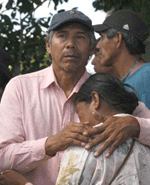Social Watch news
Published on Wed, 2011-07-06 12:09
Source: Alliance Sud. For five years, non governmental organisation Alliance Sud and swiss food multinational Nestlé have been engaged in a high-level dialogue which is innovative in more than one respect. Alliance Sud, focal point of Social Watch in Switzerland, has led two fact-finding missions into Nestlé’s operations in Colombia. These have produced concrete improvements, although the basic conflict between the multinational and trade unions remains. |
Published on Tue, 2011-07-05 07:57
Sources: WAFA, Petra, Palestine Chronicle. The Palestinian Non-Governmental Organizations Network (PNGO), which represents hundreds of civil society organizations and is a focal point of Social Watch, condemned in a statement issued this Saturday the Greek government decision of banning a ship travelling with the Freedom Flotilla II from sailing to Gaza, describing it as “unfortunate.” |
Published on Mon, 2011-07-04 10:35
Source: CELS On June 25, members of the Toba-Qom indigenous community “La Primavera” of Formosa held an unprecedented event: the election of its representative before the national government and provincial authorities. The Centre for Legal and Social Studies (Centro de Estudios Legales y Sociales, CELS), focal point of Social Watch, participated as supervisor in this process, which resulted in the election of Félix Díaz. |
|
Published on Fri, 2011-07-01 12:57
Source: Agenda Global. Economic heterodoxy is reducing inequality in South American countries while the gap between rich and poor widens in the United States, with even psychological consequences. Recent studies have concluded that income does not contribute to people’s happiness, but equity indeed does, wrote Social Watch coordinator Roberto Bissio in his last article for Agenda Global. |
|
Published on Fri, 2011-07-01 11:57
Sources: Tax Justice Network , Eurodad. Some 50 civil society organisations from all over the world claimed this week for the creation of an Intergovernmental Commission on International Cooperation on Tax Matters to protect nations from abusive practices, including evasion and the race to the bottom in corporate taxation. The claim is headed by the international networks of development groups Eurodad, CIDSE, ActionAid, Christian Aid and the Tax Justice Network (TJN), and the Danish group Ibis. |
|
Published on Fri, 2011-07-01 11:54
Source: The Irrawaddy. Through the state-run press, Burmese military regime has accused this week three Shan men of responsibility for a series of simultaneous bomb blasts in the cities of Naypyidaw, Mandalay and Pyin Oo Lwin, according to The Irrawaddy, a media group managed by Burmese journalists living in exile in Thailand. “They can’t use the word ‘culprit’ because they haven’t arrested anyone yet,” said Thein Oo, the chairman of the Burma Lawyers’ Council, national focal point of Social Watch. |
|
Published on Fri, 2011-07-01 11:48
Sources: Canadian Centre for Policy Alternatives, Winnipeg Free Press. Privatizing Manitoba Hydro, electric power and natural gas utility owned by the government of the Canadian province of Manitoba, would result in soaring power rates, job losses and the handover of an essential service to wealthy, out-of-province owners, union leaders warned this week quoting a report publisheb by the Canadian Centre for Policy Alternatives (CCPA), a focal point of Social Watch. |
Published on Fri, 2011-07-01 11:32
Source: African Agenda (Third World Network-Africa). Calls from the developing countries that suffer the worst impacts of climate change seem to fall on deaf ears in the negotiations on the road to the 17th Conference of the Parties (COP 17) of the UNFCCC next November in Durban, no matter how strident they sound, warned this week Africa Agenda, Third World Network-Africa’s bimonthly magazine. |
Published on Thu, 2011-06-30 13:01
Source: Associated Press of Pakistan Empowering women and advancing their rights can lead to progress on a range of issues, including the fight against poverty, hunger and violence. This was stressed this week by the head of UN Women, the U.N. agency tasked with promoting women’s rights in Pakistan, former Chilean President Michelle Bachelet. |
Published on Wed, 2011-06-29 11:34
Sources: Counter Balance (in English), ANND (in Arabic) A group of 67 civil society organizations from across 12 Arab countries raised concerns about the European Union (EU) and United States backed financial aid packages for Tunisia and Egypt, on the grounds that it could damage the process of democratic transitions and divert their revolutions’ economic and social justice goals. |
SUSCRIBE TO OUR NEWSLETTER








